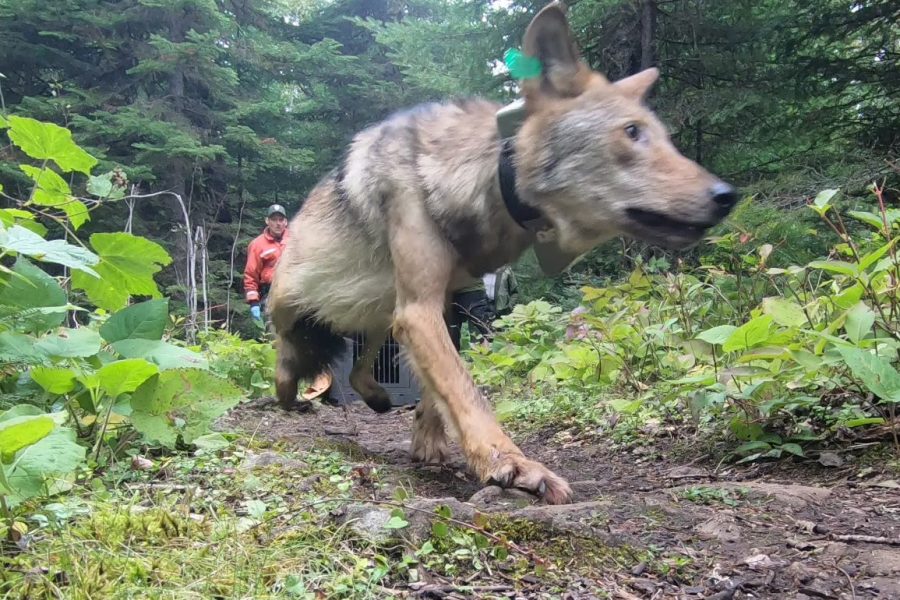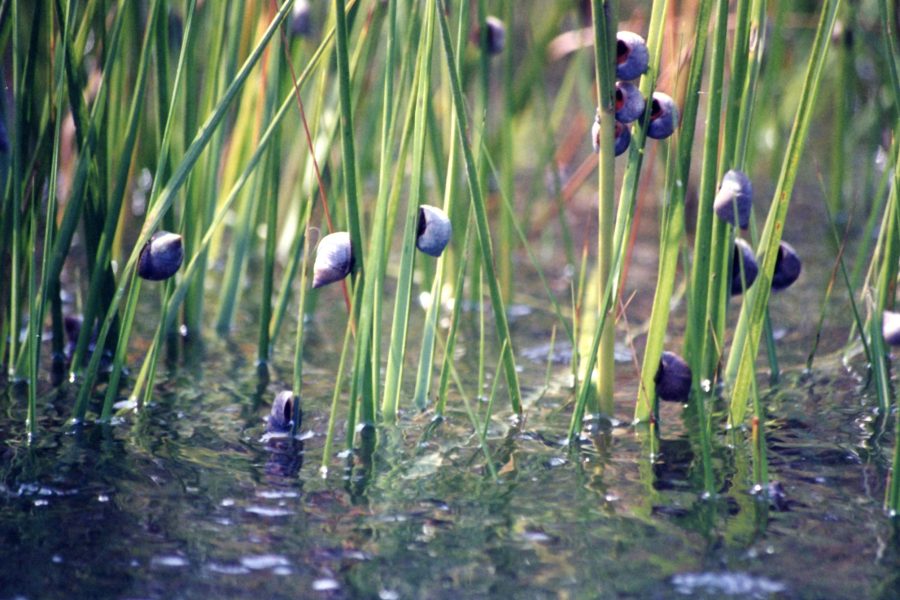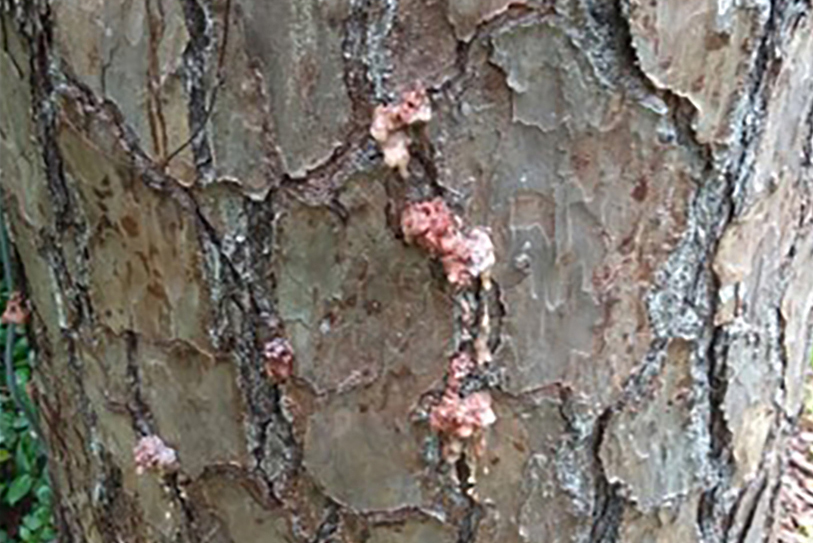May research news from the Ecological Society of America
June 10, 2024
For Immediate Release
Contact: Mayda Nathan, mayda@esa.org
The Ecological Society of America (ESA) presents a roundup of four research articles recently published across its six esteemed journals. Widely recognized for fostering innovation and advancing ecological knowledge, ESA’s journals consistently feature illuminating and impactful studies. This compilation of papers explores how wolf reintroduction affects other carnivores, how drought and grazing snails together drive salt marsh productivity, the key to an invasive fish’s success and the plight of backyard trees, showcasing the Society’s commitment to promoting cutting-edge research that furthers our understanding of the natural world.
From Frontiers in Ecology and the Environment:

A new article in Frontiers in Ecology and the Environment examines reintroduced wolves’ impact on smaller predators on Lake Superior’s Isle Royale.
Image credit: Phyllis Green, NPS | Public Domain
Wolves at the door: Response by foxes and martens to wolf reintroduction
Author contact: Mauriel Rodriguez Curras (mrodriguezcu@wisc.edu)
Essentially absent from Michigan’s Isle Royale National Park since 2018, grey wolves were reintroduced in 2019 and considered fully re-established following the forming of packs in 2020. Analysis of scat and hair samples collected over that period enabled the authors of this study to examine the impacts the wolves have had on the Isle’s other top predators, red fox and marten, which compete for prey. Wolves initially suppressed fox movement, to the benefit of martens. But foxes adapted quickly, both by scavenging wolf-killed moose and by spending more time near campgrounds, where they could find food left by campers. Notably, interactions among the three predators largely returned to normal once the wolves settled into packs, suggesting that large carnivore reintroductions may have few lasting effects on their smaller counterparts.
Read the article: The pulsed effects of reintroducing wolves on the carnivore community of Isle Royale
From Ecology:

A new Ecology study uses decades of data to examine how drought and grazing snails jointly affect salt marsh productivity.
Image credit: Mary Hollinger, NOAA | CC BY 2.0
For salt marshes, drought and periwinkle snails pack a one-two punch
Author contact: Carter S. Smith (carter.smith@duke.edu)
A decades-long study of a southeastern U.S. coastal salt marsh shows that grazers—native periwinkle snails, in this case—can exacerbate drought effects on marsh plants, particularly when snails are extremely abundant. Based on data collected over a 22-year span, the results of this analysis corroborate those of smaller-scale and shorter-term studies indicating that local stressors like grazing magnify climate-induced disturbances, such as drought. However, this research shows that the severity of the combined impacts strongly depends on snail abundance, with effects only emerging when snail numbers exceed 80 per square meter of marsh. The study authors point out that knowledge of how local stressors influence an ecosystem’s response to climate change is a critical step toward development of effective management and adaptation strategies.
Read the article: Long-term data reveal that grazer density mediates climatic stress in salt marshes
From Ecosphere:
Native fishes suckered by introduced trout
Author contact: Scott F. Collins (scott.collins@ttu.edu)
Native and introduced fishes in the mountain streams of New Mexico generally compete for the same prey, but the scramble for food is not a fair contest, according to the authors of this recent study. Comparison of growth rates between two native species, Rio Grande sucker and Rio Grande chub, and the nonnative brown trout revealed that trout grow at a much faster clip than both natives across all body sizes. This is likely because trout have an adaptive trick up their sleeve: while chub and sucker stubbornly stick to a diet of small aquatic invertebrates, trout have a broader palate that allows them to utilize a wider range of potential targets, including terrestrial invertebrates, crayfish and even other fish. Access to these alternative foods enables trout to outgrow and outmuscle chub and sucker, an especially decisive advantage when aquatic invertebrates are in short supply. The results provide further evidence that unequal resource use may be key to the success of introduced species, with important implications for the conservation and management of native freshwater fishes.
Read the article: Asymmetric competition among stream fishes: Do food web pathways affect competitive outcomes?

A recent article in Ecosphere tracks water use in backyard trees during an attack by bark beetles (which caused the discharge seen here).
Image credit: Elizaveta Litvak, from Litvak & Pataki, 2024 | CC BY 4.0
Pests and humans influence urban ecosystem response to climate change
Author contact: Elizaveta Litvak (elitvak@asu.edu)
Researchers in Florida who were gearing up to study water use by trees in residential areas saw their research take a sharp turn when they discovered that some of their focal pine trees were infested with bark beetles. But what might seem like a setback turned out to be a golden opportunity to study how environmental conditions, bark beetles and human interventions to fight beetle infestation affect water use by urban trees in real time. Monitoring the trees’ sap flux (a measure of water use) revealed that, while water use fell in beetle-infested trees, water use among beetle-free pines increased markedly, most likely because of greater access to water and light as their beetle-infested neighbors declined in health or were removed by the property owners. The findings highlight how human actions shape urban trees’ responses to stressors, providing crucial insights into urban forest management and resilience in the face of environmental changes.
Read the article: The influence of climate and management on transpiration of residential trees during a bark beetle infestation
###
The Ecological Society of America, founded in 1915, is the world’s largest community of professional ecologists and a trusted source of ecological knowledge, committed to advancing the understanding of life on Earth. The 8,000 member Society publishes six journals and a membership bulletin and broadly shares ecological information through policy, media outreach and education initiatives. The Society’s Annual Meeting attracts 4,000 attendees and features the most recent advances in ecological science. Visit the ESA website at https://esa.org
Follow ESA on social media:
Twitter/X – @esa_org
Instagram – @ecologicalsociety
Facebook – @esa.org